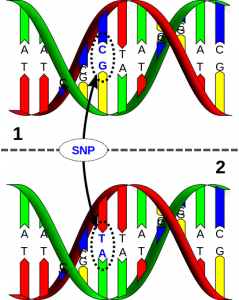WEDNESDAY, 24 APRIL 2013
The human genome is written in a code containing four chemical letters – A, C, T and G. Together, these letters make up our genomic sequence and control everything from our height to our hair colour. Sometimes a chemical letter can be switched – where you find a T in one person you may find a G in somebody else. These swaps are known as SNPs. Each one of us has millions of single nucleotide polymorphisms in our genome switches but most of them are harmless.Some polymorphisms however are commonly associated with cancer. The study led by scientists at the University of Cambridge and the Institute of Cancer Research in London, compared over 100,000 common SNPs in patients who had breast, ovarian and prostate cancer with those from healthy individuals. They found over 80 new SNPs that commonly reappeared in the cancer patients; suggesting an association with the disease. This means that the SNPs can act as genetic flags which alert scientists to high-risk genes.
One SNP raises the risk of cancer only slightly but the risk is more serious for individuals with lots of these alterations. 49 new SNPs were found associated with breast cancer; 8 with ovarian cancer and 23 SNPS with prostate cancer.
Researchers hope that these findings could lead to a DNA screening test within 5 years. Study author Prof Doug Easton said: "We're on the verge of being able to use our knowledge of these genetic variations to develop test that could complement breast cancer screening and take us a step closer to having an effective prostate cancer screening programme.”
More information can be found on the Cancer Research UK website.
Written by Martha Stokes.

